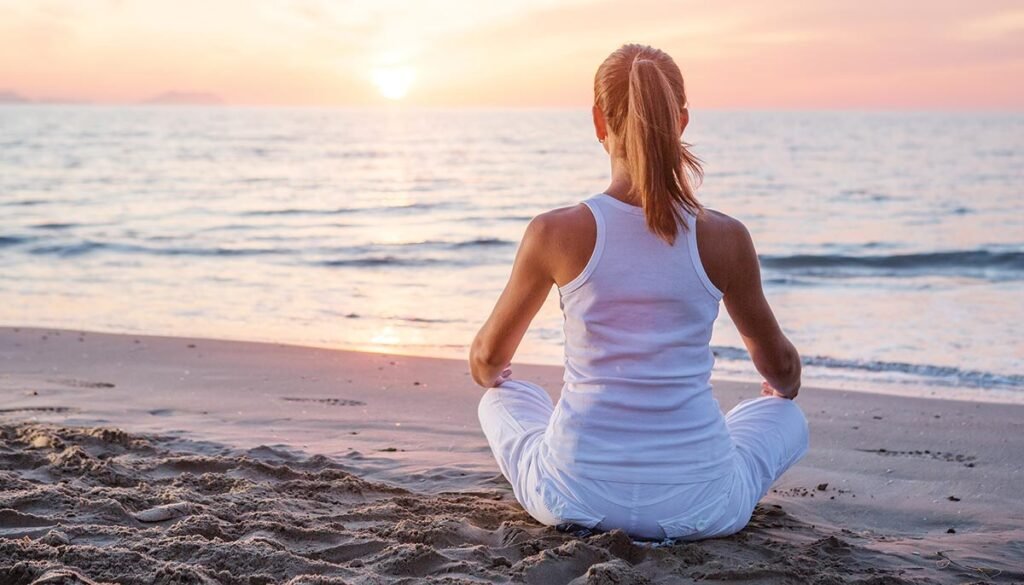Quick Summary
- It doesn't require any fancy equipment or a gym membership — all you need is a quiet space and a yoga mat.
- However, many people find it beneficial to practice yoga in the morning to energize their body or in the evening to help relax.
- So, whether you're a seasoned yogi or a curious beginner, consider incorporating yoga into your fitness routine for a holistic approach to health.
Introduction
In the fast-paced world of today, mental health has become a paramount concern. Amidst this, yoga, an ancient practice rooted in Indian philosophy, has emerged as a popular fitness trend. But yoga is not just about physical fitness; it’s a holistic practice that promotes mental well-being. This article explores the benefits of yoga for mental health.
Understanding Yoga
Yoga is a mind-body practice that combines physical postures, breathing exercises, meditation, and ethical principles. The word ‘yoga’ comes from the Sanskrit word ‘yuj’, which means to join or unite. It signifies the union of body and consciousness.
Yoga and Mental Health
Stress Relief
One of the most significant benefits of yoga is stress relief. Yoga encourages relaxation and reduces the physical effects of stress on the body. By promoting relaxation, yoga helps to lower the levels of the stress hormone cortisol. Related benefits include lower blood pressure and heart rate, improved digestion, and reduced symptoms of anxiety, depression, fatigue, and insomnia.
Anxiety and Depression
Yoga can help alleviate symptoms of anxiety and depression. By reducing perceived stress and anxiety, yoga can help to modulate stress response systems. This, in turn, decreases physiological arousal — for example, reducing the heart rate, lowering blood pressure, and easing respiration.
Improved Self-Awareness
At the core of yoga is self-awareness. By practicing yoga, individuals can become more aware of their bodies and the world around them. This heightened awareness can lead to improved self-esteem and self-perception.
Mindfulness and Concentration
Yoga also promotes mindfulness and improves concentration. Mindfulness involves focusing on your present situation without judgment. It’s a mind-body approach to life that helps people change the way they think about experiences and reduce stress and anxiety.
Incorporating Yoga into Daily Life
Incorporating yoga into your daily life can be simple. It doesn’t require any fancy equipment or a gym membership — all you need is a quiet space and a yoga mat. You can find numerous online resources, including instructional videos and guided meditations, to help you get started. Remember, it’s essential to listen to your body and go at your own pace.
How can i do yoga in home ?
Practicing yoga at home can be a great way to get started with this beneficial form of exercise. Here are some steps to help you get started:
- Create a Comfortable Space: Find a quiet, clean space in your home where you can lay out a yoga mat. This space should be free from distractions and large enough for you to move freely.
- Choose the Right Time: Yoga can be practiced at any time of the day. However, many people find it beneficial to practice yoga in the morning to energize their body or in the evening to help relax.
- Start with Basic Poses: If you’re new to yoga, start with basic poses (also known as asanas) like Mountain Pose (Tadasana), Downward-Facing Dog (Adho Mukha Svanasana), or Child’s Pose (Balasana). As you get more comfortable, you can start incorporating more complex poses into your routine.
- Use Online Resources: There are plenty of online resources available for beginners, including instructional videos and guided routines. These can be helpful for learning proper form and technique.
- Listen to Your Body: It’s important to listen to your body and go at your own pace. If a pose feels uncomfortable, don’t push yourself to do it. With time and practice, your flexibility and strength will improve.
- Consistency is Key: Try to make yoga a part of your daily routine. Even 15-20 minutes a day can make a big difference.
- End with Relaxation: End your yoga practice with a relaxation pose, like Corpse Pose (Savasana). This helps your body absorb the benefits of your practice.
Conclusion
In conclusion, yoga offers numerous mental health benefits, from reducing stress and anxiety to improving self-awareness and concentration. As a fitness trend, it goes beyond physical health, promoting mental and emotional well-being. So, whether you’re a seasoned yogi or a curious beginner, consider incorporating yoga into your fitness routine for a holistic approach to health.


